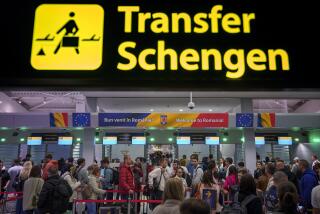Ravenous EU Looks to Dine on Riches With Hungary, Other Eastern Kin
- Share via
BUDAPEST, Hungary — If economic success is measured by the number of Burger Kings, Pizza Huts, McDonald’s, Wendy’s and Dunkin Donuts per square kilometer, then Hungary has arrived.
There are other yardsticks, too, showing this nation of 10 million people has come a long way in the seven years since the lifting of the Iron Curtain. There is the $16 billion in foreign investment, for starters, more than all other former Warsaw Pact countries combined.
Now, says Foreign Minister Laszlo Kovacs, Hungary has its economic house in order and is ready to join the 15-nation European Union when that process begins, probably early next year.
It is not alone. Nine others--Poland, Romania, Slovakia, Latvia, Estonia, Lithuania, Bulgaria, Czech Republic and Slovenia--plus Cyprus want in.
Although the EU shuns favoritism, Hungary clearly leads the pack. It has overcome many economic and political problems still plaguing other candidates, notably Romania, Bulgaria and the Baltic states.
Taking in Hungary and the others may make little sense from looking at East-West economic data. Hungary’s economy, for instance, produced goods and services worth $4,290 per person in 1995, compared with $11,650 in Greece, the EU’s poorest member, and an average of $18,637 for all the EU nations.
But EU enlargement is a matter of heart, not mind. It’s a family reunion, driven by the conviction that Europe’s Cold War divide was unnatural and should be remedied.
Historically, the EU’s eastern neighbors have had strong links with Western Europe. For centuries, Hungary was part of Austria.
“There is no alternative to an enlargement of the EU,” says Wim Kok, prime minister of the Netherlands, whose country now holds the EU’s rotating presidency.
Applicants have powerful lobbyists.
France champions Romania, citing a cultural and historic kinship. Germany won’t shut out Poland, says Peter Ludlow, head of the Center for European Policy Studies in Brussels, Belgium. Nor, he adds, will Denmark, Finland and Sweden “acquiesce in a decision to leave the Baltic states behind.”
Enlargement offers the EU the prospect of adding millions of consumers, a strong argument in the eyes of many.
The debate inside the EU is not whether to expand, but an internecine squabble over voting rights and reallocating the powers of the bigger union. One unanswered question: Should members start voting on foreign policy issues to prevent getting bogged in an endless search for consensus?
The EU does not say when Hungary and the others can join, but the first newcomers will likely come in around 2003. Once in, they get full rights: They get to join a common currency and take part in political discussions, including a vote on future members.
But their industries will also have to face EU competitors. To soften that blow, the EU may expose them gradually to its trade rules during a transition period.
“I am happy to be living in this period,” enthuses Andras Inotai, a professor of economics and special advisor to Hungarian Prime Minister Gyula Horn. “It’s the birth of something new. You’re not sure what this thing will be. Today, you are only feeling the costs of the birth.”
Those costs have been high.
Economic austerity caused consumer purchases to drop 6% in 1995 and a further 3.5% in 1996. Real wages fell 12%. Many of the health and social benefits to which Hungarians had grown accustomed were eliminated. The ruling Socialist-Free Democrat coalition has paid the price in plummeting popularity.
The positive side is that a multiparty, parliamentary democracy has been established, along with the rule of law and a market economy. More that 70% of Hungary’s gross domestic product is now produced in the private sector.
“This is a transition period for the country,” says Balint Horvath, sales director of Vilati Rt, a former machine tool company now adjusting its line, its markets and its methods.
“We have a seven-year period behind us. It wasn’t a very easy period. And the coming seven years probably won’t be any easier,” he said.
More to Read
Sign up for Essential California
The most important California stories and recommendations in your inbox every morning.
You may occasionally receive promotional content from the Los Angeles Times.













